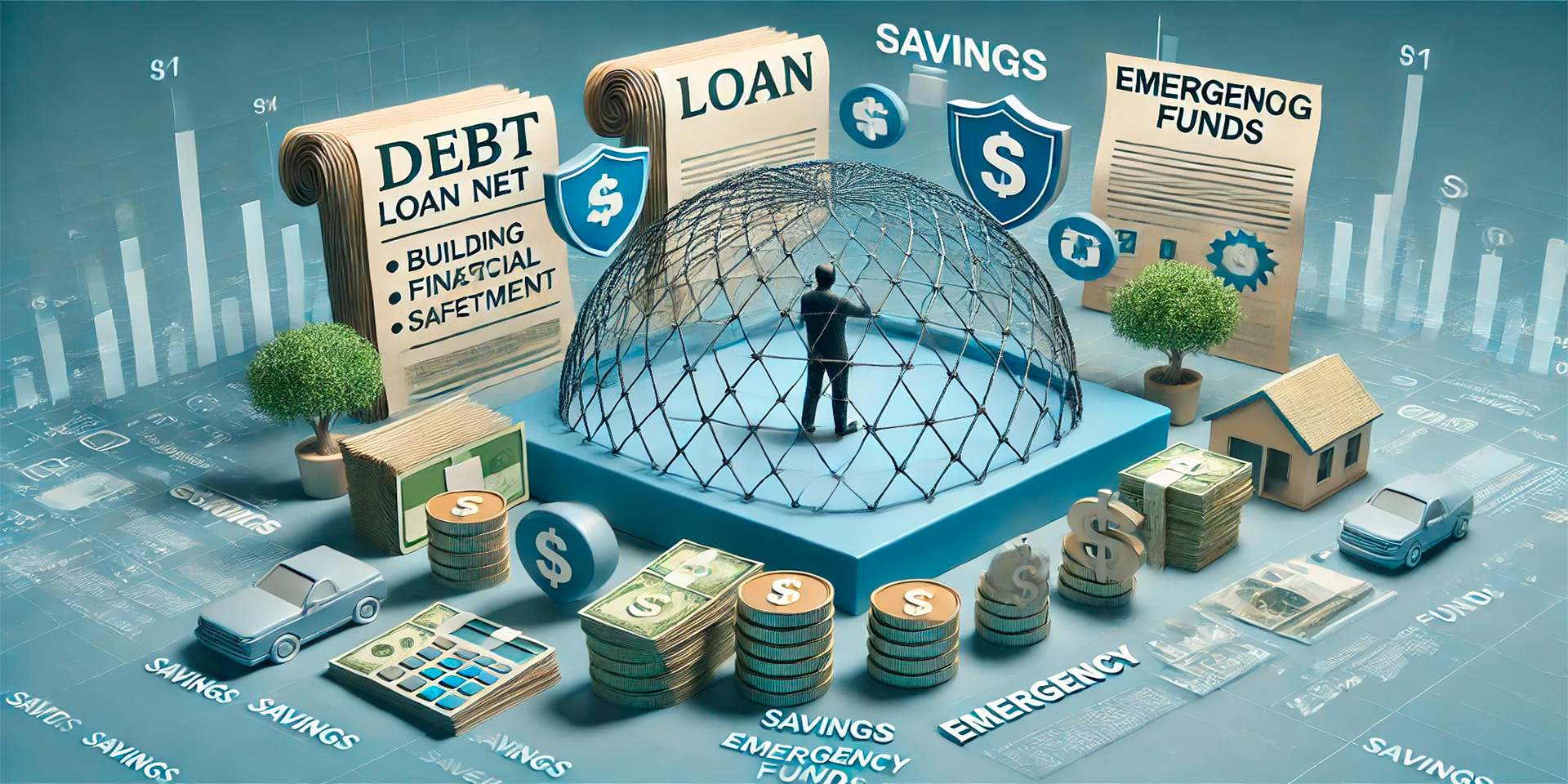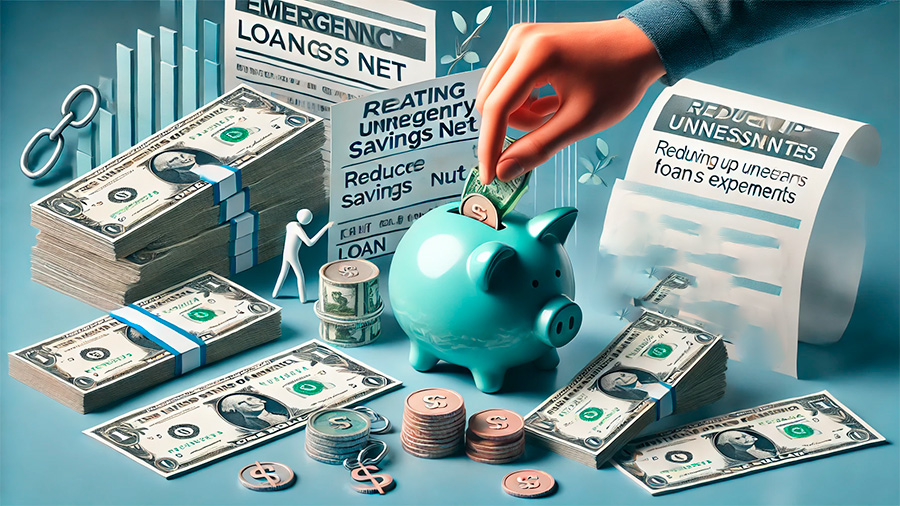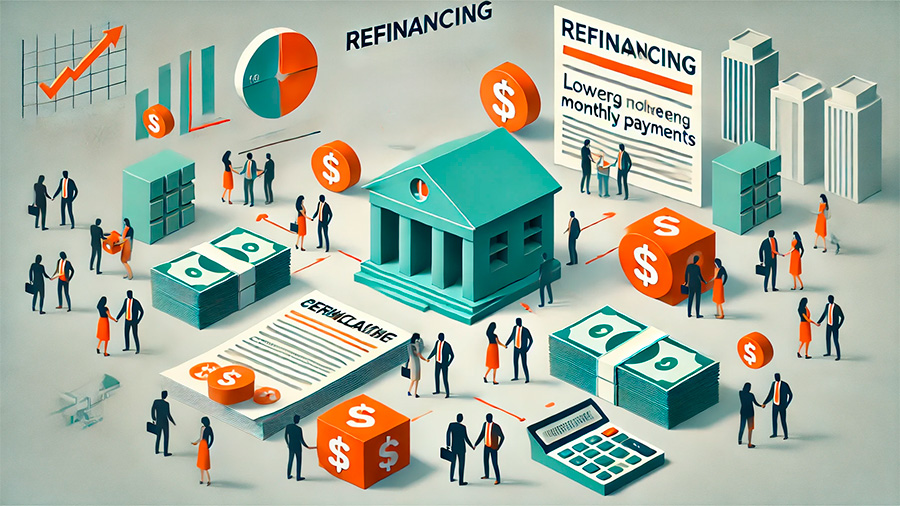
Building a Financial Safety Net for Loan Repayments During Economic Crises
In times of economic uncertainty, managing debt becomes more critical than ever. Economic downturns, such as recessions or financial crises, can lead to job losses, reduced income, and increased financial stress. Borrowers who are unprepared may find themselves struggling to meet loan repayments, risking defaults, damaged credit scores, and financial instability. Crisis-proofing your loan portfolio is essential for maintaining control over your financial obligations, regardless of external economic conditions.
This article explores strategies borrowers can implement to ensure their loans remain manageable, even during uncertain times. From understanding your current loan terms to leveraging refinancing options and creating financial buffers, these steps will help you build a more resilient loan portfolio.
Understanding Your Loan Terms
The first step in crisis-proofing your loan portfolio is having a clear understanding of your current loan terms. This includes knowing your interest rates, repayment schedules, and any penalties associated with late or missed payments. Familiarizing yourself with these details allows you to plan effectively and make adjustments if economic conditions worsen.
1. Fixed vs. Variable Interest Rates
One of the most important aspects to consider is whether your loans have fixed or variable interest rates. Fixed-rate loans maintain the same interest rate throughout the life of the loan, providing predictable monthly payments. In contrast, variable-rate loans are subject to fluctuations based on market conditions, meaning your payments could increase if interest rates rise during an economic crisis.
Key considerations for interest rates:
- Fixed-rate loans: Provide stability and predictability in loan payments, making them easier to manage during economic uncertainty.
- Variable-rate loans: Are riskier during economic crises, as interest rates may increase, leading to higher monthly payments.
2. Repayment Flexibility and Loan Terms
Another critical factor in managing your loans during a crisis is the flexibility of your repayment terms. Some loans may offer grace periods, deferred payments, or penalty-free early repayment options. Understanding the flexibility built into your loan agreements can help you make adjustments to your repayment schedule if you face financial hardship.
Evaluating loan repayment terms:
- Grace periods and deferrals: Some lenders may allow temporary deferrals of payments during economic crises without penalties.
- Early repayment options: If you have surplus cash, paying off loans early can reduce your debt burden and save on interest.

Building a Financial Safety Net
A key aspect of crisis-proofing your loan portfolio is ensuring you have a financial safety net to cover your loan payments in the event of income loss or unexpected expenses. This involves saving money specifically for emergencies and reducing unnecessary financial obligations to free up funds for essential loan repayments.
1. Emergency Savings Fund
Creating an emergency savings fund is essential for protecting yourself against financial shocks. Ideally, you should have enough savings to cover three to six months’ worth of living expenses, including loan payments. This cushion allows you to continue making loan repayments even if your income is disrupted, preventing defaults and maintaining your credit score.
Benefits of an emergency fund:
- Continued loan payments: Having a financial buffer allows you to continue making loan repayments, even during periods of income loss.
- Protecting your credit score: Timely loan payments during a crisis prevent damage to your credit score and reduce the risk of default.
2. Reducing Non-Essential Expenses
During economic uncertainty, it’s wise to cut back on non-essential expenses to prioritize loan repayments and savings. By reducing discretionary spending, you can free up more funds to cover your loan obligations, helping to ensure you stay on track even if your financial situation changes.
How reducing expenses helps:
- More cash for loan repayments: Redirecting funds from non-essential expenses to loan payments helps keep your portfolio manageable.
- Improved financial flexibility: Cutting unnecessary spending creates financial breathing room, allowing you to respond more effectively to economic changes.

Refinancing and Consolidating Loans
One of the most effective ways to crisis-proof your loan portfolio is by exploring refinancing or consolidation options. Refinancing can help you secure better interest rates, lower monthly payments, or more favorable loan terms, while consolidation can simplify multiple loan payments into a single, manageable payment.
1. Refinancing for Better Interest Rates
Refinancing allows you to replace an existing loan with a new one that has better terms. During periods of low interest rates, refinancing can be a smart strategy to reduce your monthly payments and long-term interest costs. However, it’s essential to act quickly, as interest rates may rise during or after economic crises, making refinancing less advantageous.
Advantages of refinancing:
- Lower monthly payments: Refinancing can reduce your monthly loan payments, making it easier to manage your debt during a crisis.
- Reduced interest costs: Securing a lower interest rate can save you money over the life of the loan, easing financial pressure.
2. Consolidating Loans for Simplicity
Loan consolidation involves combining multiple loans into a single payment. This can simplify your financial management by reducing the number of payments you need to track each month. Consolidation may also offer lower interest rates or longer repayment periods, making your loans more manageable during times of financial uncertainty.
Benefits of loan consolidation:
- Single payment: Consolidating multiple loans into one payment streamlines your finances and reduces the risk of missed payments.
- Potentially lower interest rates: Consolidation can offer lower interest rates, helping reduce the overall cost of your loans.
Exploring Forbearance and Deferment Options
For borrowers facing significant financial hardship during an economic crisis, forbearance or deferment options may be available. These programs allow borrowers to temporarily suspend or reduce their loan payments, providing much-needed relief during times of economic distress. However, it’s important to understand the terms of these programs and how they affect your overall loan balance.
1. Forbearance Programs
Forbearance allows borrowers to temporarily pause their loan payments without going into default. This option can provide immediate financial relief during a crisis, allowing you to prioritize essential living expenses. However, interest typically continues to accrue during the forbearance period, which can increase your overall loan balance once payments resume.
Key points about forbearance:
- Temporary relief: Forbearance provides short-term relief by pausing payments, but interest continues to accrue, increasing the total loan cost.
- Maintaining loan status: Forbearance prevents your loan from going into default, protecting your credit score and loan status.
2. Loan Deferment
Similar to forbearance, deferment allows borrowers to pause their loan payments, but in some cases, interest may not accrue during the deferment period. Deferment is often available for federal student loans or other government-backed loans, providing borrowers with additional flexibility during financial hardship. It’s essential to check the terms of your deferment agreement to understand the impact on your loan balance.
How deferment works:
- No interest accrual for some loans: In certain cases, interest does not accrue during deferment, reducing the long-term financial impact.
- Temporary payment relief: Deferment allows you to temporarily pause payments without incurring penalties, helping you manage short-term financial difficulties.
Maintaining a Strong Credit Profile
One of the most important aspects of crisis-proofing your loan portfolio is maintaining a strong credit profile. Your credit score plays a crucial role in determining your eligibility for refinancing, loan consolidation, and other financial relief options. By keeping your credit score in good standing, you ensure that you have access to credit when needed, even during economic downturns.
1. Prioritize On-Time Payments
The most important factor in maintaining a strong credit score is making on-time payments. Even during periods of financial stress, prioritizing timely payments helps protect your credit score and keeps your loan portfolio in good standing. If you’re struggling to make payments, consider reaching out to your lender to discuss payment modification options before missing any payments.
Importance of on-time payments:
- Protecting your credit score: Making on-time payments prevents negative marks on your credit report and keeps your score in good shape.
- Maintaining loan eligibility: A strong credit score ensures you remain eligible for refinancing, consolidation, or other financial options during a crisis.
2. Monitor Your Credit Report
Regularly monitoring your credit report allows you to identify and address any issues that could negatively impact your credit score. During times of economic uncertainty, errors or discrepancies on your credit report can further complicate your financial situation. By staying informed about your credit profile, you can take proactive steps to address any problems and maintain your financial stability.
Benefits of credit monitoring:
- Identifying errors: Regular credit monitoring helps you spot and resolve errors on your credit report before they affect your score.
- Staying informed: Keeping track of your credit score allows you to make informed decisions about your loan portfolio and financial strategy.
Conclusion
Crisis-proofing your loan portfolio requires a proactive approach to financial management, especially during times of economic uncertainty. By understanding your loan terms, building a financial safety net, exploring refinancing or consolidation options, and maintaining a strong credit profile, you can ensure that your loans remain manageable even in challenging economic conditions. With the right strategies in place, you’ll be better equipped to navigate financial disruptions and protect your long-term financial stability.
